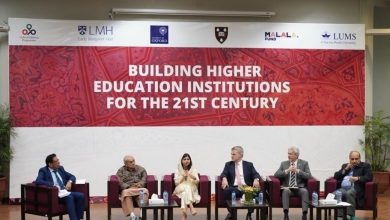Ufone 4G gives its flagship Blaze device to KPITB participants free of cost

Pakistani telecom company, Ufone 4G has provided its flagship Wifi internet device; ‘Blaze’ to each participant of the Khyber Pakhtunkhwa Women Civic Internship Program, to support their pursuit for personal and professional growth and gratification.
The first cohort of the Women Internship Program is a joint partnership between Khyber Pakhtunkhwa Information Technology Board (KPITB), Code for Pakistan, The World Bank, and the Swiss development agency, Helvetas, spanning 6-month active training and professional engagement. It has been designed to help equip fresh graduates with technological skills, practical job experience and prepare women graduates for exploring careers in Engineering, IT, and Software Development.

Currently, women from different regions of Khyber Pakhtunkhwa are enrolled in the program, during the course of which they will get an opportunity to work on citizen-facing digital services to improve citizen engagement, automate government processes, and create innovation in public service delivery. Besides creating immense social value, the engagement will also enhance their own skill set and help them emerge as better professionals by the end of the program.
“The goals of the internship program align well with Ufone’s long term commitment of enabling and empowering the society, particularly the underprivileged section of society including the women from remote areas” spokesperson for PTCL & Ufone said while commenting on the development. “Ufone has been leveraging the power of the internet for growth and development at the individual as well as societal levels. Over the years, we have actively fostered connectivity across underserved and unserved regions and brought large swathes population into the fold of digital inclusion. Our efforts are motivated by our conviction that digitization can help unlock Pakistan’s full potential for equitable economic growth and sustainability, for which we will continue to actively strive and engage”, he further added.
Dr. Ali Mahmud, Managing Director of KPITB, termed the initiative an important step towards empowering women, commended the role of Code for Pakistan as long standing partners and thanked Ufone for its support. He indicated that the initiative will be scaled up in the future to create a bigger impact leading towards a more equitable digital inclusion.
“We are delighted to partner with Ufone 4G to deliver Blaze to women Interns from the KP Women Civic Internship Program,” said Anam Zakaria, Code for Pakistan’s Head of Fellowships. “Ufone’s support will enable us to connect seamlessly with women from wherever they are, paving career pathways, enhancing civic engagement and unleashing professional development opportunities. We are excited about the partnership and, in collaboration with Ufone 4G and our partners from the KPITB, The World Bank and Helvetas Swiss Inter-cooperation, look forward to creating long-term impact for Women in Tech across Khyber Pakhtunkhwa.”
Ufone ‘Blaze’ is a handy plug-and-play 4G Wifi device that that enables users to connect to the internet from their homes. Packaged with Ufone’s superior 4G internet to cater to the needs of all user segments, the device offers the industry’s biggest internet bundles at the most affordable prices. Considering the need and dependence on quality internet in the program, Ufone ‘Blaze’ will come in handy in keeping the participants connected to seamless internet with blazing speeds at all times.




